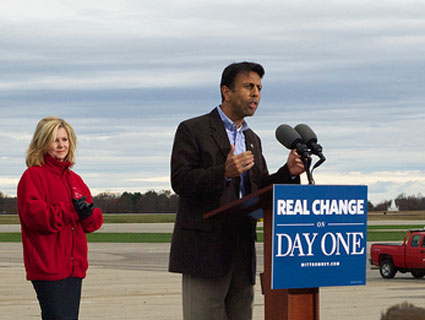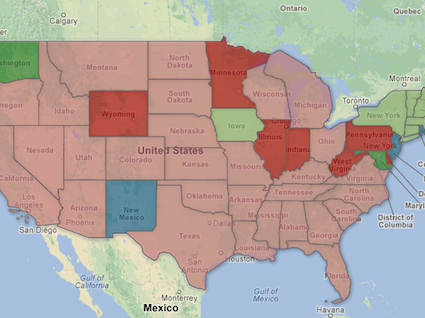Mat Staver, an influential evangelical lawyer closely linked with the Jerry Falwell-founded Liberty University, has named an unlikely culprit for the passage of four pro-gay marriage measures this year: Mitt Romney.
Staver said Monday on the Christian radio program “Faith and Freedom” that Romney’s refusal to talk about social issues led to voters in Maine, Maryland, Minnesota, and Washington State approving ballot measures backing gay marriage. Romney should’ve campaigned in those four states, Staver insisted, and played up the importance of defining marriage as being between a man and a woman only.
But because Romney’s message focused primarily on jobs and the economy, “he could not speak about life or marriage and so he didn’t campaign in those states speaking about those issues and associating himself with marriage,” Staver said, adding, “had he done so, his numbers would’ve gone up and I bet the marriage polls would’ve gone up.”
Staver called Romney “mealy” and a “one-note” candidate, and disparaged him for lacking true social values. “If you’d had a candidate that had social values, you’d have higher voter turnout,” he said. “If you had Romney, you had lower voter turnout. What ultimately happened in the general election is you had lower voter turnout.”
Watch the clip of Staver’s comments above, captured and edited by Right Wing Watch. Here’s the transcript:
“If you’d had a candidate that had social values, you had a higher voter turnout. If you had Romney, you had lower voter turnout. What ultimately happened in the general election is you had lower voter turnout.
And look at Maryland, for example: 36.6 percent voted for Romney, but 48.1 percent voted for marriage as a union between one man, one woman. Minnesota: 45 percent voted for Romney, 47.4 percent voted for marriage. In Washington, 41.8 percent voted for Romney, 46.8 percent voted for marriage. Each one of those states, more people voted for marriage than Romney. They had a contradictory vote: They voted for marriage and they voted for Barack Obama in great measure. Those are contradictory votes.
Why? Because Romney was a one-note candidate. Jobs and the economy. You’d ask him a question on what’s he going to do on immigration: jobs and the economy. Benghazi: jobs and the economy. How did he all of sudden switch it back to jobs and the economy when we’re talking about foreign affairs? He could not speak about life or marriage and so he didn’t campaign in those states speaking about those issues and associating himself with marriage. Had he done so, his numbers would’ve gone up and I bet the marriage polls would’ve gone up.
Every time we get these mealy candidates like Romney or McCain, we have this problem and then Republican pundits come up and say, ‘Oh, we need to change our position on marriage and abortion.'”












